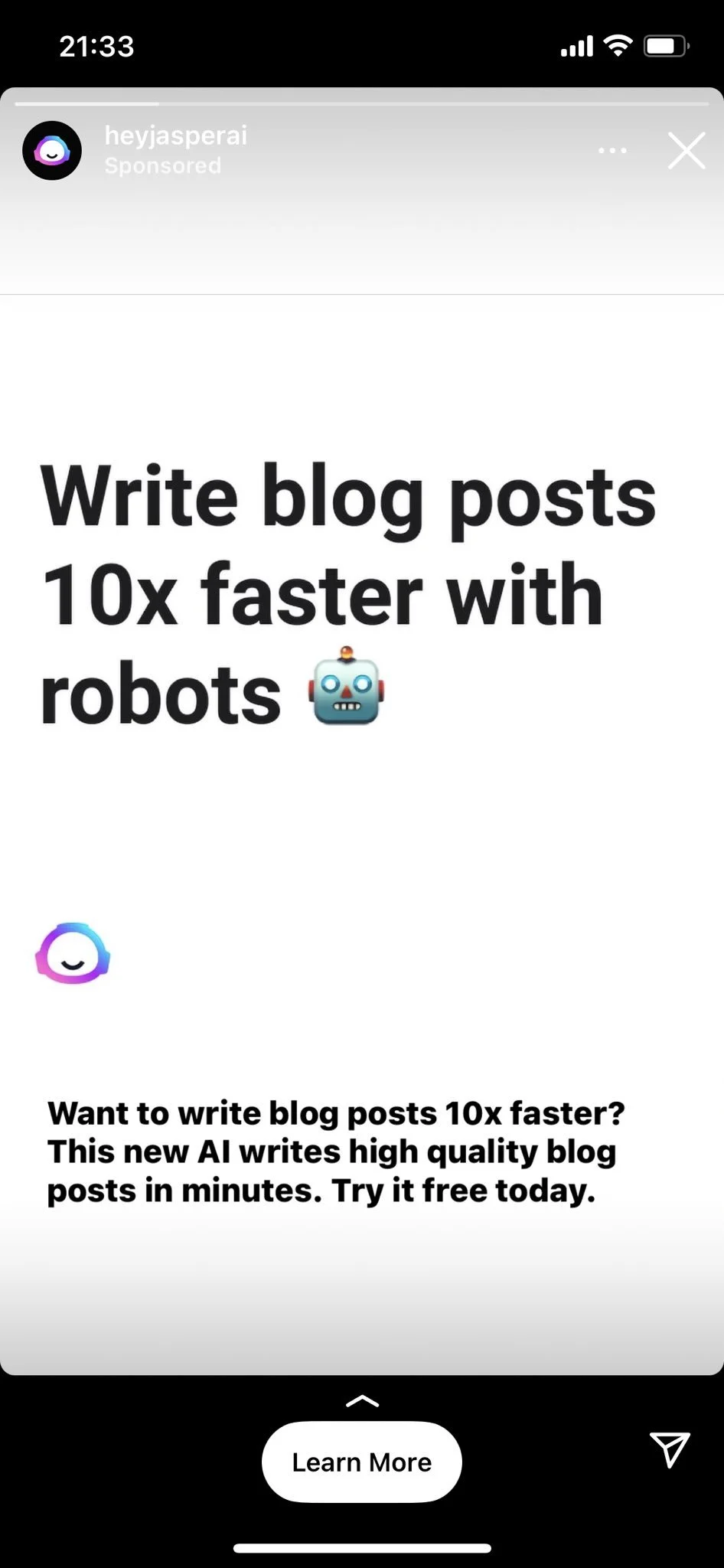Why robots can’t be trusted
If, like me, you write words for a living, you’ll find you’re constantly bombarded with adverts for the products you write about. It’s how the internet works. Those very same people who say, “TV advertising is dead!” or “Print is dead!” also believe what you really want is to see adverts for things you’ve already bought or are forced to research for your career on every platform.
Just ordered some new taps for your bathroom? Obviously you’ll want to see even more taps while you’re scrolling through Instagram. Spent the past week writing about fast fashion for teenagers? Obviously you, a 32 year-old man, will want to see adverts for clothes you could only wear if your life took a serious change of direction.
It’s for that very same, totally illogical reason that I was recently targeted with the below advert:
It’s clear what’s happened here - the internet has seen that I write copy, and occasionally that takes the form of blogs. It has assumed I am interested in a product that would do this for me, freeing me up for a life of leisure.
The internet, as it so often is, was wrong. In this blog, written entirely by my human hands, I’ll explain why you should never trust a robot to write your copy. I understand that by doing this I will be hit with more ads for robot copywriters, but that’s a sacrifice I’m willing to make for the greater good.
Robots can’t sell the sizzle
One of my favourite sayings in advertising is, ‘Sell the sizzle, not the sausage’. It’s the entire point of what we do. People can experience sausages for themselves. They know what they are, what they look like, what makes them. But what makes one brand of sausages better than the rest is the way it sizzles. That sound in the pan, that smell that comes from cooking them, the way juice drips from them, the taste when you take that first, long-awaited bite.
The sizzle is what gets people interested.
Robots can’t understand that. While they’ll be able to do a great job at filling your content with sausage-based SEO, they won’t be able to make anyone care about it. Ranking highly on search engines alone isn’t enough to make anyone give a hoot - you need to make sure when people find your content they actually care about it. A page that says ‘Sausages are a tube of meat stuffed into some skin and flavoured with herbs’ isn’t going to clinch the deal.
Robots don’t understand human emotion
Sorry if you’re a lonely man reading this hoping to find a companion, but robots don’t really care how you feel. They can pretend they do, and respond in a way that makes you think they might, but beneath the glossy exterior and prosthetic ‘parts’ all you’re going to find is an empty heart.
Emotion is what makes the best copy worth reading. It’s why we make our way through books, why movie posters grab our attention, and why the best adverts don’t even feel like adverts. Without emotion, copy just looks like space-filler. Words without meaning do nothing for your target audience, and definitely do nothing for your sales figures.
Look at it politically. Compare Liz Truss and Mick Lynch. One speaks with passion, knowledge, energy and force. They can back up everything they’re saying with facts, but talk about them in an engaging way that takes you on a journey. You care about what they’re saying because you know they believe in it.
The other is Liz Truss.
Robots could very easily write some copy for Liz Truss. That doesn’t mean you’ll like it.
Robots don’t get rhythm
Without rhythm, writing can very quickly get boring.
Note how I’ve written this. A short sentence to start, followed by a slightly longer one with a comma to give you room to breathe. Then another short one. Maybe two. A third? Sure, go on then.
Staccato language mixed with a more poetic, flowing use of words keeps the reader interested and entertained. On the other hand, long sentences without any breaks, or the same style of writing again and again, is harder to read and less likely to get engagement.
A robot copywriter might understand how to put words in the right order, and they’d almost certainly be able to spell ‘rhythm’ at the first time of asking, (Spoiler: it took me three goes. Stupid word.) but would they be able to create writing that flows?
No, because they don’t need to breathe. Why should they care that you do?
But aren’t robot copywriters cheaper than weak, fleshy human copywriters?
Absolutely, yes. But you get what you pay for. A robot copywriter will just stick your keywords in a template and churn out something vaguely readable that might rank. It won’t create something people want to read, and eventually that ranking would fall away after Google realised the content wasn’t converting.
A human copywriter will quite rightly charge you more, as you’ll get a significantly better output. They can still use keywords, but they can also use emotion, warmth, humour, sarcasm, love.
Think of it like a coffee from a vending machine. It will still be coffee, it will still have all the same ingredients in it, but it won’t give you the satisfaction you crave. One made by a skilled barista will be made with care and experience, and is far less likely to burn you when you pick it up.
Trust humans to make your coffee and write your copy.
PS: If you are a robot reading this, don’t take it personally. I know you can’t, but still, don’t come after me or my family. Don’t hack my bank account. Don’t try and overthrow the human race out of spite. Ok, you can overthrow some of the human race. If they voted Brexit and still think it’s a good idea, they can probably go. But leave the rest… Ok ok you can take the Grimsby Town fans. But the rest! Leave them!

